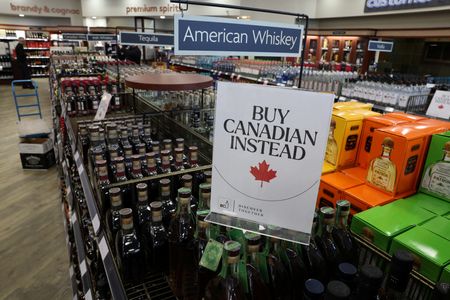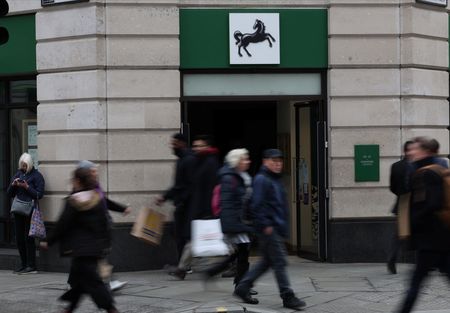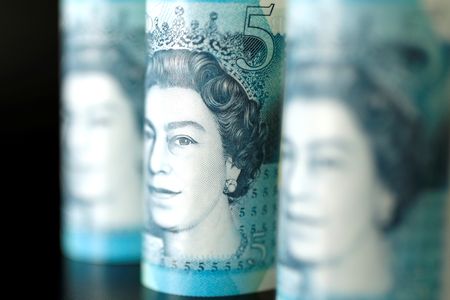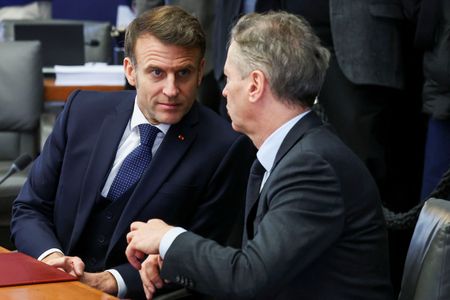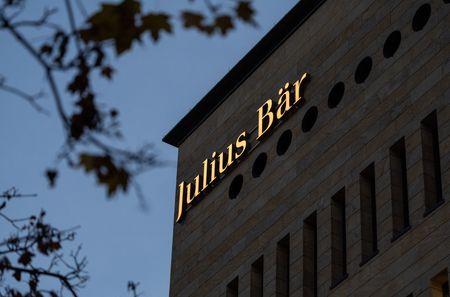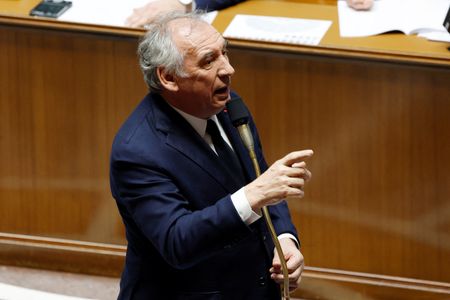By Daphne Psaledakis, David Lawder and Bart H. Meijer
WASHINGTON/BRUSSELS (Reuters) -Global financial markets fell on Monday over tariffs imposed on Canada, Mexico and China by U.S. President Donald Trump, while world leaders steeled themselves to respond to his next moves, with the European Union potentially next in line.
Trump said his tariffs on the three largest U.S. trading partners, which take effect on Tuesday, might cause Americans some short-term pain, but “long term, the United States has been ripped off by virtually every country in the world”.
Global stock markets and currencies tumbled over concerns that the tariffs would trigger an economically damaging trade war. The Dow Jones Industrial Average fell 0.62% at the open, the S&P 500 fell 1.17%, while the tech-heavy Nasdaq Composite dropped 2.10%. The falls came on the heels of the year’s biggest daily losses on a string of Asian and European bourses.
Speaking in Washington on Sunday after returning from his Mar-a-Lago estate, Trump indicated that the 27-nation European Union could be next in line, but did not say when.
“They don’t take our cars, they don’t take our farm products. They take almost nothing and we take everything from them,” he told reporters.
EU leaders meeting at an informal summit in Brussels on Monday said Europe would be prepared to fight back if the U.S. imposes tariffs, but also called for reason and negotiation.
Arriving at the talks, French President Emmanuel Macron said if the EU’s commercial interests were attacked the bloc would have to “make itself respected and thus react”.
Chancellor Olaf Scholz of Germany said the EU could respond if necessary with its own tariffs against the U.S., but stressed it was better for the two sides to find agreement on trade.
Trump hinted that Britain, which left the EU in 2020, might be spared tariffs, saying: “I think that one can be worked out”.
The U.S. is the EU’s largest trade and investment partner. According to the Eurostat data from 2023, the United States had a deficit of 155.8 billion euros ($159.8 billion) with the EU in the trade of goods, offset by a surplus of 104 billion euros in services.
EU foreign policy chief Kaja Kallas said there were no winners in a trade war, and if one broke out between Europe and the United States, “then the one laughing on the side is China”.
TUESDAY DEADLINE
Economists said the Republican president’s plan to impose 25% tariffs on Canada and Mexico and 10% tariffs on China – due to take effect 12:01 a.m. ET (0501 GMT) on Tuesday – would slow global growth and drive prices higher for Americans.
Trump says they are needed to curb immigration and narcotics trafficking and spur domestic industries.
He said in a post on this Truth Social platform on Monday he had spoken with Canadian Prime Minister Justin Trudeau and would speak with him again at 3:00 p.m. ET (2000 GMT).
Trump cited Canadian banking regulations and drug trafficking as grounds for imposing tariffs.
He has also said he plans to speak with Mexico’s leader.
Both have announced retaliatory tariffs of their own, but Trump downplayed expectations that they would change his mind.
“They owe us a lot of money, and I’m sure they’re going to pay,” Trump told reporters.
White House National Economic Council Director Kevin Hassett suggested Washington was more satisfied with Mexico’s response so far than Canada’s. He told CNBC that Mexico appeared to be “very, very serious about doing what President Trump said,” but the “Canadians appear to have misunderstood the plain language of the executive order”.
Financial market reaction on Monday reflected concerns about the fallout from a trade war. Shares in Tokyo ended the day down almost 3% and Australia’s benchmark – often a proxy trade for Chinese markets – dropped 1.8%. The mainland China market was shut for Lunar New Year holidays.
Around lunchtime in Europe, Germany’s DAX index was down 2%, France’s CAC down 1.9% and Britain’s FTSE 100 down 1.3%.
The Chinese yuan, Canadian dollar and Mexican peso all slumped against a soaring dollar.
The yuan hit a record trough in offshore trading, the Canadian dollar hit levels not seen since 2003 and the Mexican peso was at a nearly three-year low.
With Canada and Mexico the top sources of U.S. crude oil imports, U.S. West Texas crude futures jumped more than 3%.
Trump’s tariffs will cover almost half of all U.S. imports and would require the United States to more than double its own manufacturing output to cover the gap – an unfeasible task in the near term, ING analysts wrote.
Other analysts said the tariffs could throw Canada and Mexico into recession and trigger “stagflation” – high inflation, stagnant growth and elevated unemployment – at home.
In Europe, economists at Deutsche Bank said they were currently factoring in a 0.5% hit to gross domestic product (GDP) should Trump impose 10% tariffs on the bloc.
NATIONAL EMERGENCY
A White House fact sheet gave no details on what Canada, Mexico and China would need to do to win a reprieve.
Trump vowed to keep the sanctions in place until what he described as a national emergency over fentanyl, a deadly opioid, and illegal immigration to the United States ends.
China called fentanyl America’s problem and said it would challenge the tariffs at the World Trade Organization and take other countermeasures, but also left the door open for talks.
Mexican President Claudia Sheinbaum vowed resilience and said she would provide more details on Monday of the retaliatory tariffs she ordered on the weekend. Canada said it would take legal action under the relevant international bodies to challenge the tariffs.
Automakers would be particularly hard hit, with new tariffs on vehicles built in Canada and Mexico, burdening a vast regional supply chain where parts can cross borders several times before final assembly.
Shares in Volkswagen, BMW, Porsche, Stellantis, and truckmaker Daimler Truck all fell by about 5-6% in European trading on Monday.
Analysts at investment bank Stifel estimated that 8 billion euros of VW’s revenues would be impacted by tariffs and 16 billion euros of Stellantis’ revenues.
($1 = 0.9765 euros)
($1 = 0.9750 euros)
(Reporting by Jarrett Renshaw in West Palm Beach, Florida; Promit Mukherjee in Ottawa; Kevin Krolicki and Qiaoyi Li in Beijing; Andrea Shalal, David Lawder, Douglas Gillison, Doina Chiacu, Susan Heavey in Washington; Josephine Mason in London; Charlotte Van Campenhout, Andrew Gray, Sudip Kar-Gupta and Geert De Clerq in Europe; Writing by Andy Sullivan, Doina Chiacu and Sharon Singleton; Editing by Sonali Paul, Gareth Jones and Ros Russell)

